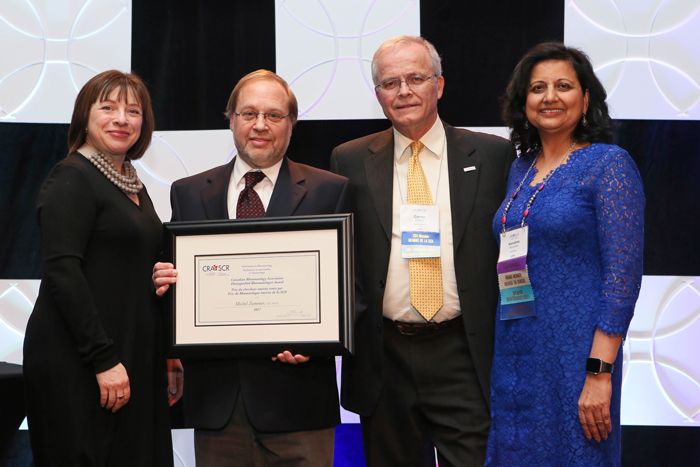Summer 2017 (Volume 27, Number 2)
Distinguished Rheumatologist:
Dr. Michel Zummer
Download PDF
Why did you become a rheumatologist? What or who influenced you along the way to do so?
Back then, during our internal medicine residency, we had two-month rotations in each specialty. Most of us had no clue about rheumatology. I was impressed by the amazing attitude of the patients who adapted to significant disabilities, even though we had very little to offer in the way of disease-modifying antirheumatic drugs (DMARDs) compared to today. Since we are not a hit-and-run speciality, we develop lifelong relationships with our patients. The ability to make a diagnosis based primarily on history and physical exam is still true today. We remain mostly low-tech. Half my career has been pre-biologic medications and half post-biologics including optimized treatment strategies. It has been really exciting to see the positive impact on our patients, who have experienced amazing improvements in symptoms and function. I am looking forward to the next era, using new targeted oral medications.
You have served in leadership roles within the CRA. You joined as a board member in 2000 and served as president from 2004-06. You’ve helped organize joint CRA-Mexican College of Rheumatology (MCR) meetings and have been vice-president of the Pan-American League of Associations for Rheumatology (PANLAR) since 2012.
(a) Why was getting involved so important to you?
I was “dragged” into the CRA after making a phone call to Dr. Glen Thomson, who was then president, about an economic issue we had in Quebec. Before I knew it, he had me chairing a committee. That lit the fire and I got more engaged and interested in what the CRA could do to facilitate change in each province. We learned to adapt to the changing therapeutic landscape and evolve our interactions with industry. I like to think that national leadership and knowledge shared between the different jurisdictions have improved care for people with arthritis.
(b) How has your work helped shape the field of rheumatology here and elsewhere?
I have had the privilege to work with hundreds of incredible rheumatologists and other individuals at the CRA and at the Arthritis Alliance of Canada (AAC) to develop a framework for the delivery of musculoskeletal (MSK) care to people with arthritis. It is very satisfying to see the start of many significant changes and improvements in various provinces, which have used the resources or the influence of the AAC to further their cause.
What is the greatest professional and organizational challenge you have faced, and how did you address/overcome this?
While most of my organizational work has occurred on the national level, I did hold leadership positions in Quebec. Much success has been achieved by the hard work of many rheumatologists in other provinces, especially Ontario, Alberta and British Columbia. However, instituting change in Quebec has been extremely difficult, despite the strong leadership of our recent presidents. Our provincial government refuses to acknowledge arthritis as a chronic disease, and therefore has not dedicated any planning or resources to our patients. Recently, all point-of-care decision-making capabilities have been removed, and healthcare delivery has been homogenized. I believe that this will lead to further erosion of the quality of care that we are able to provide.
What do you foresee as challenges to Canadian rheumatologists in the future and what can individual rheumatologists and the CRA do to meet these challenges?
Canadian rheumatologists, as well as all physicians, must maintain our professionalism, respect our responsibilities and resist becoming public servants obedient to system administrators. We must identify and act on opportunities to push partnerships with governments and all stakeholders to include the views and needs of our patients and our healthcare providers. This has started in several provinces and the CRA should continue to help foster these activities.
What do you most enjoy about living and working in Montreal?
Sandra and I are both born and bred Montrealers, who love our city (if you can ignore politics, crumbling infrastructure, and construction nightmares). We live in a walkable city, which has many great and varied cultures, and amazing food.
Michel Zummer, MD, FRCPC
Chief of Rheumatology,
CH Maisonneuve-Rosemont
Associate Professor,
Université de Montréal
Montreal, Quebec

Dr. Zummer receiving his award from Dr. Joanne Homik, Dr. Carter Thorne, and Dr. Vandana Ahluwalia
|
